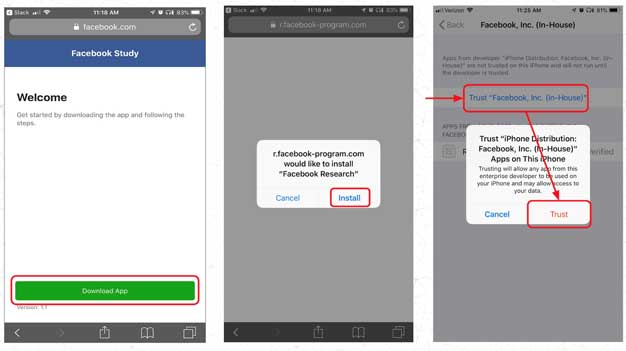Facebook Paid Teens To Install Spyware VPN App That Monitored Their Every Move
Facebook just can't put itself in a good light lately. A new report has shined a bright light on a Facebook policy that was paying people to install something called the Facebook Research VPN. Facebook allegedly paid teens and and adult users to install the VPN, which allowed the company to collect all the user's phone and web activity at all times.
Facebook had a similar app called Onavo Protect that was banned by Apple last summer. The new Facebook Research VPN app is said to potentially violate Apple privacy policy, and was available for Android devices as well.
Facebook admitted to TechCrunch that it was running the research program and had since 2016. The social network was paying users from 13 to 35 years old up to $20 monthly, plus referral fees, to install the iOS or Android Facebook Research app and give up all mobile privacy. The app went so far as to ask users to take screenshots of their Amazon order history page. Reports indicate that the program was run via beta test services Applause, BetaBound, and uTest to help hide Facebook's involvement. The project was allegedly called "Project Atlas" in some documentation.
Since TechCrunch broke the story about the app, Facebook has stated that it will close the iOS version; however, the app will continue to be available on Android devices. Apple has made no comment thus far on if Facebook violated its privacy policy, however, speculation suggests that it might have been told by Apple privately to remove the Facebook Research app, just as iit was asked privately to remove Onavo Protect last year. The Facebook research App granted the social network "nearly limitless access to a user's device" including location information, chat history, emails, photos and videos sent, and more according to Guardian Mobile Firewall's Will Strafach.
The social network has faced more privacy blunders and bugs that share private information than you can shake a stick at. An API bug last year exposed photos taken by 6.8 million users. When Facebook recently announced its plans to merge WhatsApp, Instagram, and Facebook Messenger, the move was met with concerns about security and antitrust.


